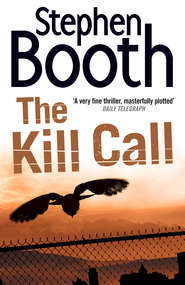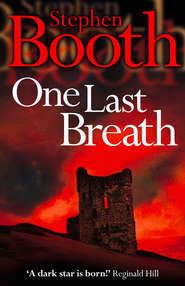По всем вопросам обращайтесь на: info@litportal.ru
(©) 2003-2024.
✖
Blind to the Bones
Автор
Год написания книги
2019
Настройки чтения
Размер шрифта
Высота строк
Поля
‘No.’
Scott let him wait for a minute, looking around the church with a smile.
‘Have you heard from Neil today, Vicar?’ said Scott.
‘No, I haven’t. And he said he’d be here to help me work on the churchyard.’
‘Good old Neil.’
Scott walked up to the oak pulpit and smoothed the pulpit cloth with his hand. Alton wished he wouldn’t touch anything, but he held his peace.
‘I phoned Philip and he called at Neil’s house, but he’s not at home. Do you know where Neil is, Scott?’
‘No idea.’
Scott walked back down the aisle of the church, slapping the ends of the pews again as he went. Alton listened to Scott go out into the porch. He needed to make sure that the young man had left. He knew that the big oak outer door would close with a painfully loud slam, as it always did.
A thud shook the church as Scott Oxley slammed the door. Layers of dust danced on the window ledges. But the stained-glass picture of St Asaph didn’t shatter. It wasn’t the time. Not yet.
5 (#ulink_c4274710-0431-5ec1-b561-2d40e8793093)
Sarah Renshaw looked as though she hadn’t combed her hair that morning. She had a perm several weeks old, but it was springing out in all the wrong directions, like a burst mattress. Her plaid skirt was covered in dog hairs, and her shoes had dried mud clinging to the edges of the soles.
Also, her eyes were bright and her face looked unnaturally flushed. In a younger person, Diane Fry would have suspected alcohol or substance abuse. With a woman of Mrs Renshaw’s age, her first thought was the menopause. Hot flushes and irrational behaviour – that’s what the menopause offered.
Fry shuddered a little as she experienced one of those moments when the future poked its unpleasant face into her mind and leered at her.
Gavin Murfin had been chattering cheerfully to the Renshaws as he brought them upstairs. Fry had been able to hear him all the way along the corridor, telling them little jokes about the difficulties of getting good detectives these days. As they came nearer, Murfin had been explaining that after he had done twelve years in CID, his reward would be that he’d get sent back on the beat, because twelve years was the maximum tenure for a detective constable.
‘Of course, they don’t call it being on the beat any more,’ he said. ‘They call it “core policing”. That’s because everyone says “Cor blimey, not this bloody lark again.”’
Murfin had ushered the Renshaws in and pulled a face at Fry over their shoulders. She realized he had simply been filling the silence with words to avoid having the Renshaws talk to him. It was quite clear that Sarah and Howard Renshaw were more than happy to discuss their daughter. But it felt so odd that they talked about her in the present tense. It clashed with the conviction that Fry was already forming in her own mind.
‘Emma had phoned us just the day before, to say she’d be home on the Thursday afternoon,’ said Mrs Renshaw. ‘She’s always very good about phoning us.’
‘Yes.’
‘But she never arrived. We thought she’d changed her mind, or that something had come up in Birmingham. We couldn’t get through to her on her mobile, because it was switched off. So we rang the house where she lives during the term, and the girl she shares with told us she’d gone home for Easter. But she hadn’t gone home. She never arrived.’
‘No.’
‘We rang the police in Birmingham, but they weren’t interested,’ said Mrs Renshaw.
‘It was Smethwick,’ said her husband. ‘The local station.’
Howard Renshaw was a big man, well padded, like a businessman who had eaten too many lunches. His hair was a little too long for the image, but at least he combed it away from his bald patch rather than trying to hide it. He looked neater than his wife, as if he took more care over his appearance. But he sat back in his chair, slightly behind Sarah, to let her take centre stage.
‘Anyway, they weren’t interested,’ said Sarah. ‘They said she was an adult, and it was up to her what she did. Unless we had evidence that a crime had been committed, there was nothing they could do.’
‘I don’t think that’s quite right,’ said Fry. ‘She was a young woman under the age of twenty-one. Enquiries are always made in those circumstances.’
Mrs Renshaw shook her head briefly, as if bothered by a small fly. ‘So we went to the house ourselves. Number 360B, Darlaston Road, Bearwood. We had to get the landlord to open Emma’s room, because all the tenants have their own individual keys. One of Emma’s bags was gone, and some clothes she must have packed to bring home with her.’
‘What about personal items? A purse? Car keys?’
‘She had a couple of shoulder bags, and those little rucksack things, so I couldn’t tell which she was planning to carry with her. But her purse wasn’t there with her credit cards, or her keys.’
‘She has a car, but she decided not to take it to the West Midlands with her,’ said Howard. ‘The car’s still in our garage. It’s an Audi.’
‘It’s only two years old,’ said Sarah.
‘But if she had her purse, some money, her credit cards –’
‘We know. The police said she could have gone away somewhere, if she had money with her.’
‘I’m afraid it happens all the time, Mrs Renshaw. In a city full of students, the police will have a lot of similar cases to deal with every year.’
‘Emma’s at the Birmingham School of Art and Design,’ said Sarah, as if that were somehow different from being just a student. ‘She’s studying for a BA in Fine Art. She’s particularly interested in Marketing Design. In fact, she should have had a placement last year, but she’s missed it now. It’s going to be very difficult for her to catch up.’
‘Emma’s very talented, you know,’ said Howard. ‘You must see some of her work. We have all kinds of things in the house. Some of them are pieces we brought back home from her room at Bearwood – work she’d done during term time.’
‘She wouldn’t want those to be lost,’ said Sarah. ‘There are some pieces that she hasn’t finished yet.’
Not finished yet? Diane Fry looked hard at the couple. Hope was one thing – but did the Renshaws genuinely believe their daughter would turn up tomorrow, or the day after, to finish her latest design project or take her Audi for a run?
She watched Sarah Renshaw turn towards her husband. They exchanged a meaningful glance and a little private smile, as if there were no one else in the room.
‘We made our own posters,’ said Howard. ‘My brother had them done for us at his office. “Have you seen this girl?” they said. We put them up in newsagents and at the students union, and at all the places she went to in Birmingham and the Black Country. Some of them weren’t the nicest of places, you know – bars and clubs, not the sort of establishment we would go in normally, or expect Emma to, either. But she’s a student, and they live a different life. We understand that.’
‘She’s an art student, of course,’ said Sarah. ‘They’re allowed to be a little Bohemian, aren’t they?’
‘But no one had seen her?’
‘No.’
‘Mr and Mrs Renshaw, you know that the West Midlands police did make some enquiries at the time.’
‘Oh, yes? But what sort of enquiries? We expected them to be going door to door, doing fingertip searches. Helicopters with thermal cameras. All the things we see on the TV news when other people’s children go missing. They didn’t do any of that. We kept complaining. We spoke to an inspector several times. We went to the local newspapers to expose the shortcomings of the police. But it didn’t do us any good. They just thought we were a nuisance.’
‘For children, some of those things would be done. But Emma was nineteen. And, as I say …’
‘… it happens all the time. Yes, we know. Hundreds of young people go missing every year, and nearly all of them turn up again unharmed. We’ve been told that. But none of those are our daughter.’
‘I realize it must have been very difficult for you. A difficult thing to live with.’
‘Difficult? Do you know, we panic if we ever get separated in a crowd, or if it ever feels as though we’ve lost each other. Until it’s happened to you, it’s impossible to understand that sense of suddenly losing a person that belongs to you. It’s like being cut off from something you were part of. It’s the sort of fear that can take a hold on you completely, on your entire life. I don’t think we’ll ever lose that feeling, either of us. Not until we find Emma.’
‘What sort of mood had Emma seemed to be in up to that point?’











